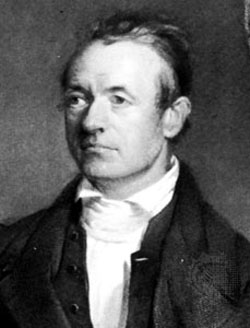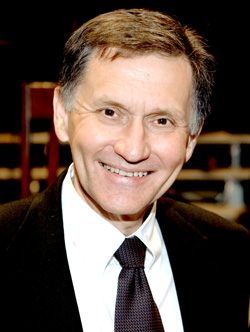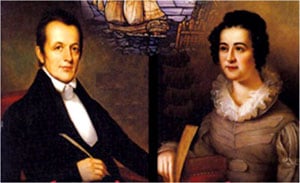 |
| Adoniram Judson |
(Sept. 21, 2012 - by Harold Goerzen) While 200 years have elapsed since U.S. missionary pioneer Adoniram Judson set sail for Myanmar (Burma), his methodology, commitment and persistence are lessons that remain timeless, applying as much today as they did in 1812.
"He was well ahead of his time," HCJB Global President Wayne Pederson told about 30 attendees at his workshop, "The Mega-Shift in Global Ministry," at First Presbyterian Church in Colorado Springs, Colo., Monday, Aug. 22.
"He lived in a time when missionaries typically did all the leading, but the gospel was carried to the Burmese people primarily by their own people-not necessarily by the missionaries," explained Pederson at the "2012 Summer Gathering," an annual event of the Evangelical Covenant Order of Presbyterians (ECO). "The spread of the gospel was done mainly through local partners, and that's the way we work at HCJB Global."
Since the 1990s, HCJB Global has worked with local partners to plant more than 400 community radio stations in more than 100 countries worldwide. "In Indonesia alone we have worked with partners to plant more than 50 radio stations," Pederson said. "Our main partner there has planted 1,100 churches." In more recent years the mission has also been working to help establish partner medical clinics that touch people's physical and spiritual needs.
The growth of the church in Myanmar throughout the decades continues to astound missiologists. Today the country is home to more than 4.5 million Christians (9 percent of the population), including 2.5 million evangelicals. The church keeps growing despite the predominance of Buddhism, the repression of certain ethnic minorities and hostility directed toward believers who are perceived by some as having an imported, Western religious orientation. Spearheaded by the country's indigenous missions movement, the church is growing at a rate three times faster than the population.
"Judson's first goal was to translate the Bible into Burmese and establish one church," Pederson related. "Today Myanmar has the third-largest number of Baptists of any country in the world, all tracing their roots to Judson."
 |
| Wayne Pederson |
Although statistics are not clear, it appears there were "between a dozen and 25 enduring Burmese converts at the time of Judson's death," wrote Paul Borthwick in his article, "Endurance Personified in the Life of Judson," published by Mission Frontiers in May 2012. "But one mission had been completed. The Burmese had the Bible in their own language …. a Bible translation that has stood the test of time-over 150 years! It stands as a testimony to Judson's scholarship and meticulous linguistic study."
Pederson pointed out that Judson's success didn't come without numerous trials. His work brought bitter hardships, imprisonment and family tragedy, including the deaths of his first two wives and nearly all members of his immediate family before he died in 1850. Yet he never wavered in his commitment to win people to faith in Christ and to translate the Bible.
"Matthew, the head of the Myanmar Evangelical Fellowship, says people know the Judson name well. Tears come to their eyes when they talk about him, and they still use the Burmese Bible that he translated about 150 year ago," Pederson related.
He quoted Judson's son, Edward, who said, "Suffering and success go together. If you are succeeding without suffering, it is because others have suffered before you. If you are suffering without succeeding, it is that others after you may succeed."
Pederson encouraged the audience with numerous statistics detailing the growth of Christianity around the world. "Seventy percent of church growth in the last 2,000 years has been in the last 100 years," he said. "In 1960 there were just 89 million evangelicals, 2.9 percent of the world's population. But by 2010 there were 546 million evangelicals-7.9 percent of the world's population (according to the 2010 edition of Operation World)." When all Christian faiths are factored in, there are 2.1 billion Christians across the globe-nearly a third of the world's population.
"Why is this happening?" Pederson asked. "The gospel can move more freely now. Who would have known five or 10 years ago that HCJB Global would be putting radios stations in Nepal? There is also more political freedom in the world-fewer dictatorships and a growing democratic movement. Some of the revolts worldwide have also facilitated changes."
 |
| Adoniram Judson and his first wife, Ann (known as Nancy), who died in Burma after 14 years of marriage. |
In a surprise turn of events, an uprising in 2008 brought about by a Maoist struggle led to the fall of Nepal's 240-year Hindu monarchy and the establishment of a democratic government. This resulted in opportunities for Christians and others to establish community radio stations.
Pederson pointed out that new media-such as social networking and mobile devices-have opened doors to spread the gospel, especially in under-reached countries and among certain demographic groups such as generation Y (children of baby boomers). "It took 38 years for radio to reach 50 million people and 13 years for television to reach 50 million, but the Internet did it in four years, the iPod in three, Facebook in two and Twitter in six months," he explained.
"Some of the uprisings in the Arab world were fueled by new media as the use of smartphones increases," Pederson continued. "In India, 920 million people own mobile devices. In Indonesia, new believers are being followed up with text messages and Skype."
According to the website, churchleaders.com, in the last six years alone more than 1.4 million churches have been established worldwide with 250 million people committing their lives to Christ. "The evangelical population has doubled in 10 years, and we could see the evangelical church double again in our generation."
The figures aren't as rosy for Western Europe where atheism and secularism are dominant and church attendance has dipped below 2 percent. "But according to Patrick Johnstone (co-editor of the first six editions of Operation World), the proportion of nonreligious people in the world has peaked."
Much work remains, especially as only about 14 percent of the world's Christians are willing to share their faith with others, Pederson said. "Are we ready to reach out to Muslims, Hindus, Buddhists and others with the love of Christ?" he asked. "How do you engage people of other religions with their customs, cultures and languages? Do we want them to be Western Christians or believers within their own culture?"
"You can't serve someone you don't understand," admonished Pederson. "You can't understand others until you've learned information about them. You can't learn important information until there's trust in the relationship. To build trust, others have to know you respect them as persons. Before you can communicate acceptance, they must experience openness. Openness with people different from yourself happens when you step out of your comfort zone."
Sources: HCJB Global, Operation World, Mission Frontiers
